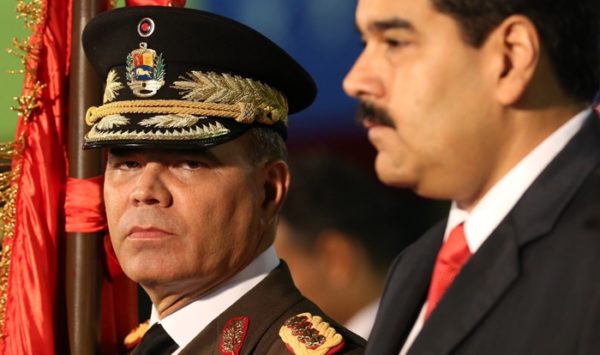
Several of the top Venezuelan generals who the Trump administration says can allow aid into Venezuela have family living in the United States that could be expelled from the country, McClatchy and the Miami Herald has learned.
They are among a group of six generals who U.S. officials have indicated could receive amnesty from U.S. sanctions if they disobeyed Venezuelan President Nicolas Maduro and allowed aid to be distributed by non-governmental organizations inside the country. But President Donald Trump has warned they could “lose everything” if they don’t.
Last week, Florida Sen. Marco Rubio named the six Venezuelan generals who U.S. officials say are key to allowing aid into the country. They include Gen. Vladimir Padrino, Maduro’s defense minister; Adm. Remigio Ceballos, admiral in chief of the armed forces; Maj. Gen. Jesús Rafael Suárez Chourio; Adm. Giuseppe Alessandrello Cimadevilla, head of the navy; Maj. Gen. Edgar Valentín Cruz Arteaga; and Maj. Gen. Antonio Benavides Torres.
McClatrchy and the Miami Herald learned that several of them have family in the United States. It’s unclear whether those families are living in Miami.
A senior administration official told reporters Friday that the administration has collected data on military leaders who have family in Miami, the Caribbean and across the hemisphere.
“They will have to go back and live in the misery that they’re imposing,” the official said.
In a moment of truth for the country, Venezuela’s interim president, Juan Guaidó, is leading an opposition effort Saturday to try and compel the military to allow humanitarian aid stockpiled on the border into the country.
U.S. national security adviser John Bolton, who canceled his trip to South Korea to focus on Venezuela, is seeking to keep attention on the crisis via social media.
“Now is the time for Venezuelan military to allow aid through the border,” Bolton said. “As Interim President Guaidó said today, ‘Those who accompany us to save the lives of Venezuelans are true patriots.’”
Venezuelan police and military immediately clashed with demonstrators on the border with Colombia. With tensions escalating, security forces in riot gear fired tear gas at opposition activists who were throwing rocks in return.
But Guaidó, who briefly boarded one of a dozen trucks carrying the aid, has yet to penetrate the wall of Venezuelan security forces.
Otto Reich, a former assistant secretary for Western Hemisphere affairs under George W. Bush, praised the administration for taking a bold step and encouraged allies to follow suit.
“We have had 20 years of Chavismo,” Reich said. “Here we are the country that they call the enemy and the empire and here is where they spend their weekends and send their children to be safe.”
In a speech to the Venezuelan community in Miami on Monday Trump warned members of the military that they risked their lives and livelihood if they didn’t allow humanitarian aid to enter into the country.
“If you choose this path you will find no safe harbor, no easy exit and no way out. You will lose everything,” Trump said to cheers from the crowd. “They are risking their lives and risking their future for a man controlled by the Cuban military.”
Trump took similar action against the family members of senior leadership in Venezuela.

Leave a Reply
You must be logged in to post a comment.